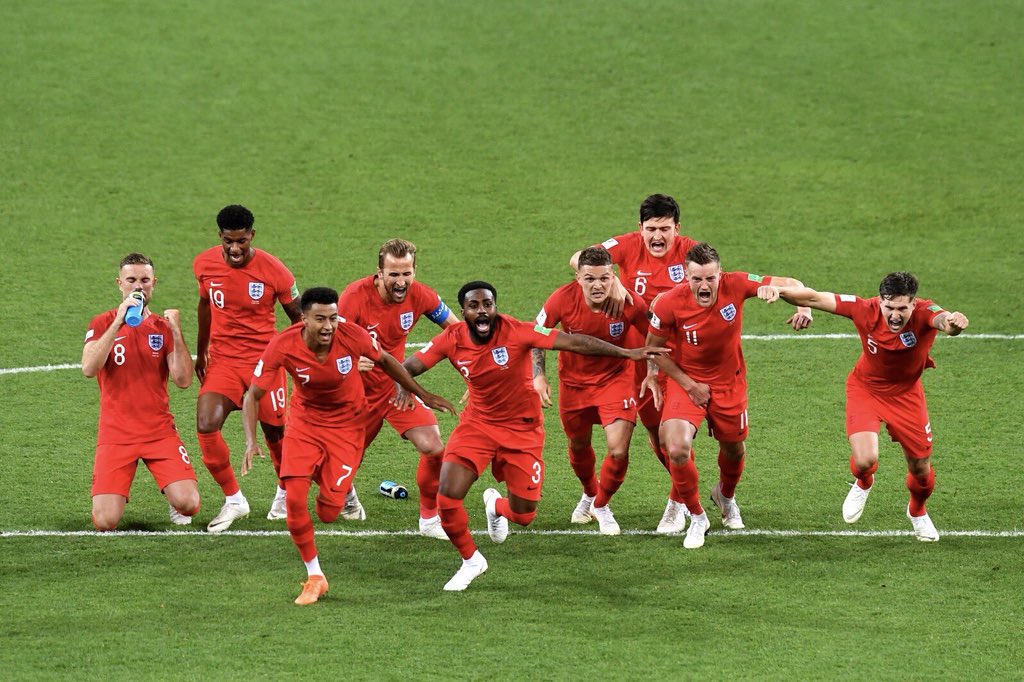Talented, Diverse, a Team – This England Side is the Opposite of the Country’s Ruling Elite
by Aaron Bastani
7 July 2018

Watching England beat Colombia on penalties was the first time I have been emotionally invested in the success of our national side since the 2006 World Cup.
The reason for this, more even than winning, is how the previously dominant celebrity culture has been discarded. Rather than egos, haircuts and WAGs, football has taken centre-stage.
That 2006 team, player for player, was far better than this year’s. Rio Ferdinand, John Terry, Ashley Cole and Gary Neville were the best back line in the competition. Ahead of them were Beckham, Lampard, Gerrard and Joe Cole – plausibly the strongest midfield that summer too. Further forward were Michael Owen and a twenty-year-old Wayne Rooney. It was a world class team, but it went nowhere.
This year’s side has talent of course. Harry Kane is one of Europe’s best finishers and there are class performers like Kyle Walker and John Stones, both on course to become defenders of elite stature.
But the strength of this team lies in being a resilient unit rather than a collection of individuals. What’s more, rather than feeling burdened by irrational expectation, this is a group intent on forging its own story. Listening to Gareth Southgate, they play with a sense of purpose that transcends football: “We’re a team with our diversity and our youth that represent modern England. In England we have spent a bit of time being a bit lost as to what our modern identity is. I think as a team we represent that modern identity and hopefully people can connect with us.”
Regarding the facts, Southgate is right. This side doesn’t embody the values projected by the country’s establishment, nor the right-wing xenophobes keen to make the St George’s Cross a symbol of white nationalism. For a start, it is drawn from across the country – and in more ways than one. The three starting centre-backs are Yorkshiremen, one of whom is mixed race. Jordan Henderson and Pickford both hail from Wearside, while Marcus Rashford and Jesse Lingard are United players with West Indian roots. In their regional spread, as well as racial diversity, this team reflects the nation as a whole – far more than our media, judiciary or political representatives. For ordinary people – whether white, brown or black, whether from Tyneside or Toxteth – a sense of intuitive identification makes perfect sense.
Indeed were you to choose an image of modern England, those young men running towards Jordan Pickford after his final penalty save is a better fit than the iconic signifiers offered in recent years. More so than a grinning Farage holding a pint of bitter aloft, or an ashen Theresa May repeating empty words nobody is actually listening to. Unlike most of those in the public imagination, these are working class people set to be world class. They have, for the most part, chosen professional success over celebrity status.
Then there is Gareth Southgate. When people refer to role models in football, they usually mean the players. Yet that is precisely what England’s manager has become for millions of adult men. With this thoughtfulness and calm, Southgate stands at odds with the management style and masculinity that many learn to model. He hasn’t become a winner by seeking to dominate, but by being confident and respectful. After an era of political leaders who seek to define success by overwhelming others – from Thatcher to Trump – Southgate’s emotional intelligence seems the leading edge of something new. And better.
In an era of systemic crisis and enduring uncertainty, a World Cup triumph would be a balm to England’s bruised ego. It would allow a deteriorating national psyche to delude itself once more that it really is great. For all the joy of sporting achievement, that would be a disaster. More importantly, it would represent a missed opportunity. There is no reason for this young, multiracial team to be recuperated by xenophobic nationalism.
Instructive here is the French experience after winning the World Cup two decades ago. Then, with a diverse side reflecting a multiethnic nation, the country’s liberal establishment declared a country at ease with itself. While that was a seductive message, it also wasn’t true. Four years later Jean-Marie Le Pen made the last two in the country’s presidential elections, while month-long riots – cutting across racial as well as class lines – unfolded in 2005.
Potential English success this time round should provoke the opposite response. Rather than saying this side, with its diversity, work ethic and humility, reflects England, we should point to the gap between it and our elite institutions – the country as it really is and its representatives.
How can you compare a side with a boy born in Kingston, Jamaica to a government which demands parents of British-born children take DNA tests to prove they are actually related? Or a squad drawn from every corner of England to a political class that only cares about the country beyond London when it comes to getting votes or taxes? How can a prime minister partly responsible for the Windrush scandal claim to admire players whose families hail from the West Indies? Or hard-working young people while the survivors of Grenfell remain unhoused?
The truth is you can’t. Our ruling establishment and this team might as well be from different planets, let alone countries.
This England team shows the path to a country for the many: multiracial and intent on breaking with a troubled past. Unlike in France, a collapsed centre will be unable to recuperate success within convenient, erroneous narratives. This side in no way reflects our broken, divided country. But it could.